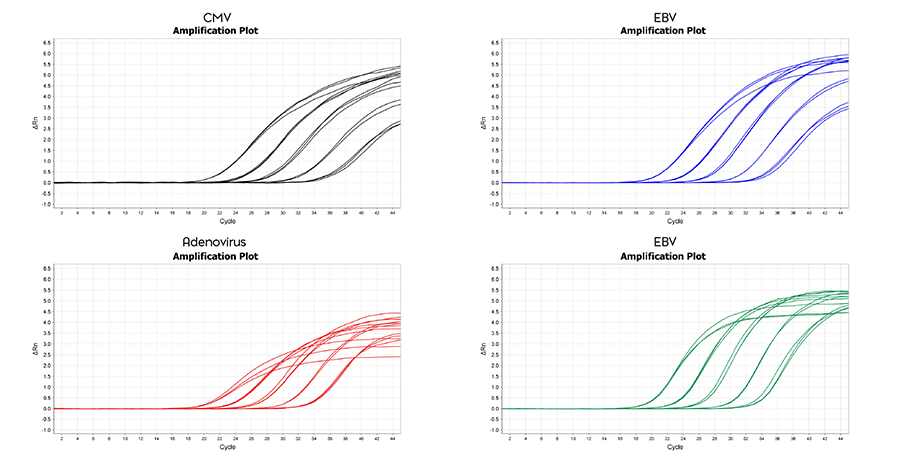Lyo-Ready™ qPCR Buffer w/o Excipients, 4x
分子诊断检测正逐步向冻干方向发展。其优势包括室温运输和储存,延长保质期和增加样品体积的灵活性。然而,为了与干燥兼容,核心酶必须是不含甘油的,并含有专门的赋形剂,以保证反应混合物在各种条件下,包括冰冻,高温,真空和脱水,依然保持稳定性。一个理想的冻干配方应该使酶在冻干状态下保持稳定,并且能够快速复水和再活化,而不影响复水后的性能。
Powerful multiplexing capacity

Three viral sequences, Cytomegalovirus (CMV) Adenovirus, Epstein-Barr Virus (EBV) and a DNA Extraction Control were amplified with equal efficiency from synthetic DNA templates with -Ready™ qPCR Mix in a quadruplex qPCR probe assay. The result illustrates that all three viruses were amplified with high efficiency and sensitivity, demonstrating the ability of Lyo-Ready™ qPCR Mix to detect low-copy number DNA targets simultaneously from a single sample.
Lyo-Ready™ qPCR Buffer w/o Excipients, 4x, MDX061
Available in 2.5 mL (500 Rxns) or 100 mL (20,000 Rxns) aliquots
Description
Lyo-Ready™ qPCR Buffer w/o Excipients is a glycerol-free qPCR reaction buffer that allows formulation optimization to freeze-drying methods by excipients selection. In order to produce room temperature lyophilized qPCR reagents, lyo-excipients, a lyo-compatible Taq DNA polymerase (such as MDX011 or MDX015), assay-specific primers, and probes are added to Lyo-Ready Buffer for subsequent freeze-dry.
Specifications
| Description | A glycerol-free qPCR reaction buffer that is designed to allow formulation optimization to freeze-drying methods by excipients selection. In order to produce room temperature lyophilized qPCR reagents, lyo-excpients, a lyo-compatible Taq DNA polymerase, assay specific primers and probes are added for subsequent lyophilization. |
| Concentration | 4x |
| Appearance | Clear, colorless solution |
| Application | Fast qPCR |
| Sample type | cDNA, DNA |
| Presentation | 1 vial |
| Storage | -20 °C |
| Mix stability | See outer label |
| Consistency | ± 0.5 Ct variance between test and reference sample |
| DNA Contamination | None detected in PCR amplification with traces overlay with the negative control on E. coli and mouse genomic DNA specific targets. |
| DNase Contamination | No detectable degradation |
产品资料
分子诊断的原料试剂解决方案分子诊断的原料试剂解决方案
开发常温稳定检测的分子试剂开发常温稳定检测的分子试剂
FAQs: Lyo-Ready qPCR Buffer w/o Excipients, 4x
Slope of standard 10-fold dilution curve indicates qPCR efficiency. The efficiency of the qPCR should be between 90–110% (−3.58 ≥ slope ≥ −3.1). If the efficiency is greater than 100%, this indicated inaccurate sample and reagent pipetting, if it is less than 100%, this indicates your samples may contain PCR inhibitors or your qPCR primer and/or probe design may not be optimal.
Yes, reaction conditions are the same and they will produce the same Ct values, even with multiplex qPCR assays. This means that the liquid mixes can be used to create SOPs if you do not want to lyophilize and then later if lyophilization is required (for example to increase sensitivity), the SOP can be updated for lyophilization, it does not require completely new SOPs to be written.
Many fluorescent qPCR primer- and probe-based chemistries have been devised and are available from different commercial vendors for molecular diagnostic tests, the two most used are:
• Hydrolysis (TaqMan) probes. The main advantages of using hydrolysis probes are high specificity, a high signal-to-noise ratio, and the ability to perform multiplex qPCR reactions. The disadvantages are that the initial cost of the probe.
• Molecular beacons. Molecular beacons are highly specific, can be used for multiplexing, and if the target sequence does not match the beacon sequence exactly, hybridization and fluorescence will not occur. Unlike hydrolysis probes, molecular beacons are displaced but not destroyed during amplification and can be used for melt curve analysis if necessary. The main disadvantage is that they are difficult to design, requiring a stable hairpin stem that is strong enough that the molecule will not spontaneously fold into non-hairpin conformations but not be too strong, or it may not properly hybridize to the target.
The Lyo-Ready™ qPCR Buffer w/o Excipients, 4x has some inhibitor tolerance, but for amplification from crude lysates or inhibitor-rich samples we recommend using are optimized Lyo-Ready™ Specimen-specific™ (blood, saliva, urine, stool, and plant) qPCR and LAMP mixes.
Following lyophilization in the presence or absence of primers and probes, the Lyo-Ready™ qPCR Mix is stable for a minimum of 24 months at ambient temperature (17 – 23 °C). Following rehydration, the assay reproducibility, sensitivity, and robustness will be the same as for a freshly made liquid mix, making the mixes ideal for point-of-care molecular diagnostic tests and microfluidic qPCR devices.
No, our lyo-excipients are proprietary, if you require a buffer containing lyo-excipients, we have the Lyo-Ready™ qPCR Buffer, 2.5x (MDX022).
与我们的专业团队联系
想了解更多迈迪安免疫和分子产品信息?欢迎与我们联系